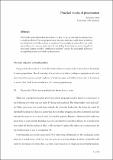Files in this item
Practical modes of presentation
Item metadata
| dc.contributor.author | Glick, E. | |
| dc.date.accessioned | 2016-02-17T10:10:17Z | |
| dc.date.available | 2016-02-17T10:10:17Z | |
| dc.date.issued | 2015-09 | |
| dc.identifier | 209411462 | |
| dc.identifier | 87d59d9b-41af-4e24-8ac8-3a268cf91e06 | |
| dc.identifier | 84937969474 | |
| dc.identifier | 000358438300007 | |
| dc.identifier.citation | Glick , E 2015 , ' Practical modes of presentation ' , Noûs , vol. 49 , no. 3 , pp. 538-559 . https://doi.org/10.1111/nous.12052 | en |
| dc.identifier.issn | 0029-4624 | |
| dc.identifier.uri | https://hdl.handle.net/10023/8246 | |
| dc.description.abstract | The Intellectualist thesis that know-how is a kind of propositional knowledge faces a simple problem: For any proposition p, it seems that one could know p without knowing how to do the activity in question. For example, it seems that one could know that w is a way to swim even if one didn't know how to swim oneself. In this paper I argue that this "sufficiency problem" cannot be adequately addressed by appealing to practical modes of presentation. | |
| dc.format.extent | 22 | |
| dc.format.extent | 428794 | |
| dc.language.iso | eng | |
| dc.relation.ispartof | Noûs | en |
| dc.subject | B Philosophy (General) | en |
| dc.subject.lcc | B1 | en |
| dc.title | Practical modes of presentation | en |
| dc.type | Journal article | en |
| dc.contributor.institution | University of St Andrews. University of St Andrews | en |
| dc.contributor.institution | University of St Andrews. Philosophy | en |
| dc.identifier.doi | 10.1111/nous.12052 | |
| dc.description.status | Peer reviewed | en |
| dc.date.embargoedUntil | 2015-10-11 |
This item appears in the following Collection(s)
Items in the St Andrews Research Repository are protected by copyright, with all rights reserved, unless otherwise indicated.

